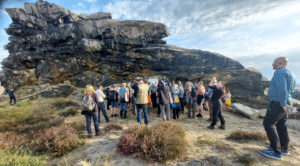INQUA 2515 sy: Palaeosoil Analysis in Late Glacial Sandy Terrains Across Europe (PAST)
The PAST project aims at developing a European database of Late Glacial palaeosoils in aeolian coversands and dunes as a tool to evaluate paleoenvironmental changes.
Abstract
All over Europe, the stepwise amelioration in climate during the Late Glacial period is preserved in the geological record of sandy terrains. However, in strong contrast with loess archives, this continental-wide sandy archive has yet to be unlocked concerning the timing and nature of paleoenvironmental changes that took place.
The research question of this project can be described as follows: (1) does the current Late Glacial palaeosoil record allow us to investigate if palaeosoil development was synchronous or diachronous, and, if so, can we identify spatiotemporal patterns, and (2) does the available information on paleopedological development allow us to infer in which paleoenvironmental conditions the spatiotemporal evolution took place.
The project will be organized around a specific meeting and meeting-related field trip in the Deliblato sand area, Serbia. The site is located in the southern part of the Pannonian Basin, allowing us to directly correlate with other palaeosoil archives in the same region. One of these is the Đurđevac Sands, which were investigated in the ACCENT project (Abrupt Climate Changes – Evidence from Quaternary Sedimentological Sequences in Croatia, funded by the Croatian Science Foundation). Altogether, these two sites will be the starting point for building a European-wide palaeosoil database in Late Glacial sandy terrains.
Objectives:
- Collect published research on Late Glacial palaeosoils intercalated in aeolian sands and dunes
- Start developing a Late Glacial database of aeolian sand-intercalated palaeosoils
- Present findings to experienced scientists and interested researchers
- Extend the project’s scope to new collaborators and locations
- Conduct comparisons of palaeosoils from Đurđevac and Deliblato Sands
Project leaders:
- Dr. Lidija Galović – Croatian Geological Survey, Zagreb, Croatia
- Dr. Koen Beerten – Belgian Nuclear Research Centre, Belgium

Activities scheduled:
The main activity in the PAST project is the workshop to be held 5-7 May 2025 in the Special Nature Reserve “Deliblato Sands”, Serbia (Protected by UNESCO: Tentative List | More Info). The preliminary field trip map is given below.






